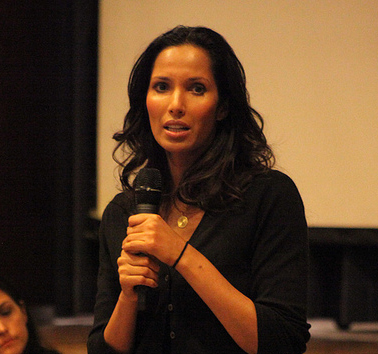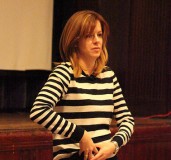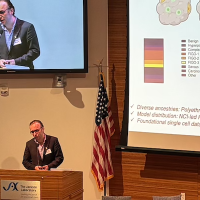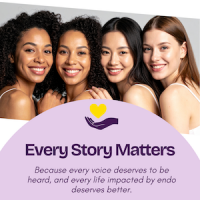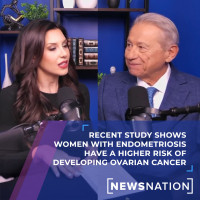Endometriosis Foundation of America
Endometriosis 2013
Padma Lakshmi
Without further ado I am going to introduce Padma who is the co-founder with Tamer Seckin of the Endometriosis Foundation of America.
Good afternoon and thank you for joining us. I have been keeping track of all the discussions that have been going on through my phone. It is amazing. I am getting minute by minute reports of egg freezing and infertility discussions. And I am so glad that all of you are here. I hope you that you will go and share everything that is discussed and gleaned from these days. We appreciate your participation. We really look forward to an ongoing exchange of ideas, not only in the medical community, but also to reach out into the general public.
I know today we are talking a lot about patients and the reason that I got involved with Endofound and at Dr. Seckin's insistence and encouragement, is because I became very angry at the fact that I personally was only diagnosed with endometriosis at 36. I am a college educated woman. I have a lot of resources at my disposal that many Americans cannot even imagine having. I have health care, which is very comprehensive. I have access to the best doctors in Los Angeles or New York or London, where I lived as well. And yet I too fell through the cracks and I did not fall through the cracks because I did not know something was wrong. I did fall through the cracks because I had negligent doctors. I sincerely believe that I had very well meaning, caring, intelligent doctors who gave me as good a care as they would have given their own sister or daughter or wife. But they just did not know any better.
If you look at most of the hospitals and most of the leading doctors and surgeons in this country that head departments, be they in hospitals or academia, they are often in their 60s. Twenty years ago, 25 years ago when those doctors were starting out, I can say this because I have doctors in my family whom I love very much, there was not the research and there certainly was not the technology that there is now. And there was not the sharing of information and the modes and capability of communication that we, today, standing in this room and living in this country are privileged to have.
I encourage you to not only talk to other medical professionals, not only talk to other gynecologists, but also talk to any surgeon or practitioner working in the body cavity. I was operated on by a gastro doctor who, had he known there was a bigger, underlying problem, I am sure he would have given me different care. So I encourage you if I could just ask everyone in this room to just repeat one important thing that you come away with from this weekend to someone else, and maybe start a discussion, then Dr. Seckin and everything he and I are trying to do will have been worth it, just that little thing.
You have been talking about eggs this morning I know. I was diagnosed at 36. I got divorced at 37 and at 38, almost 39, I found myself single and childless and, you know, feeling like many women feel in their 30s and even early 40s that we have squandered our whole soul, some of our life for other parts of our life.
There is a lot of guilt and anger I felt in myself for not taking better control of my own body and not going to that second or third gynecologist and saying, "Wait a minute. Why am I taking handfuls of Vicodin every month?" I should have done that but I thought that the doctors knew better. Doctors should listen to patients and patients should listen to their own bodies. Pain is your body's way of telling you something is wrong. We need to listen to our bodies and communicate with each other. We need to share information as women with each other, with other women, with younger women and we need to share information with our mates.
I never liked to call our foundation a women's health foundation, although clearly, biologically, it is an issue that affects women. I consider endometriosis a family health issue because not only does it affect that woman biologically it affects her personally. And it affects every woman that that woman loves. Every woman she cares for, every person she cares for, every person that wants to care for her and loves her. It affects her professional life and of all her colleagues. It affects her emotional life and thereby it affects us all, as a culture and as a society.
One in ten women has endometriosis. When I learned about my body when my mother had that talk about the birds and the bees she said to me, my mother has a Masters in public health, she is a nurse, she said to me, "I had a lot of cramps [and I knew this because I saw her with the heating pad four or five days every month] and I am sure that you probably will too. Some women get it and some women don't. It is just your lot in life". It is not your lot in life. It really is not. And that little seed, we have to watch what we say to our children as they are forming. They are not only forming their bodies but their identities and their relationships to their own bodies and their self-esteem.
Imagine if my mother had not been told the same thing by her mother. Imagine if my mother had said, "If this happens we're going to find out why. And we are going to try and fix it as much we possibly can so that you can go to hockey practice or dance class or math club, [which probably I was not going to go to anyway] but whatever. And you can live the life that you should have the opportunity to live".
We all are not equal but we all should have the opportunity to be equal. And that is what this conference is about among many other things. We are very pleased to have with us someone who will speak after the lunch break. She will be speaking not only about some of the issues I talked about as well as her own professional life, but hopefully illuminate many more issues surrounding this illness after the break.
Please come back.



